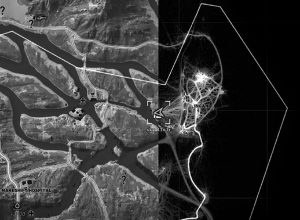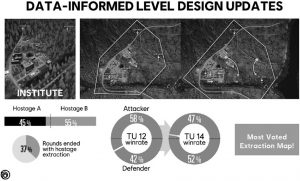Although all sorts of companies are looking to learn from their products – video game developers are ahead of most other industries. In our recent study of Ubisoft’s Ghost Recon Wildlands project team (published in the California Management Review), we identified three ways that Ubisoft learns from its products. Here’s the summary video:
Data-driven Exploration refers to how game design teams explore data in an open-ended way. This can involve gameplay data, but could also involve looking at player message boards and such. The idea is that, like detectives, the design team identifies anamolies or opportunities in the data, then chases them down to get more information.Sometimes design teams will create software utilities to help with pattern recognition to support this sort of exploration. For example, Ubisoft’s Ghost Recon Wildlands team created “heatmap” functionality that shows developers popular paths through the game world. In analyzing the heatmaps, designers identified new modes of gameplay of which they were not aware.

(Image: Ubisoft)
Data-Augmented Ideation describes how design teams use data to support the ideation process. Game design is fundamentally a creative act that originates in the minds of game developers. This creative spirit is not supplanted by data, but can be complemented by it using gameplay data to iteratively inspire creative ideas during the design process. Essentially, designers actively interrogate data as they look for new ways to improve the game, and as they add new ways to improve the game they iteratively test. For example, Ubisoft’s Ghost Recon Wildlands team interacted and improved and refined new functionality of a multiplayer map called the “Institute” over time and in conjunction with data.

(Image: Ubisoft)
Data-Informed Validation refers to the classic way that design teams test and revise new game features. Essentially, they create new functionality and test in gameplay, then revise based on what they see. For example, Ubisoft’s Ghost Recon Wildlands Team thought to develop a new form of currency for the game involving “prestige credits.” Through a series of design refinements, the design team essentially transformed the economy of the game over time.
Overall, in studying Ubisoft’s project, we identified a set of best practices for product assisted learning that organizations of all sorts can use. In order to maximize opportunities from product data, organizations need to build data-oriented capabilities, use diverse data sources, know those data sources intimately, iterate between exploration and confirmation, and augment and inform designer visions.
A full version of the study can be found here:
https://journals.sagepub.com/doi/full/10.1177/0008125620915290